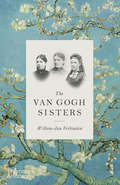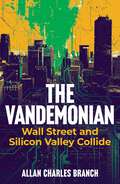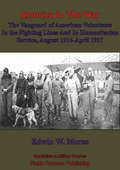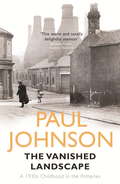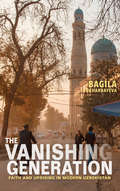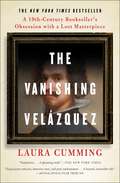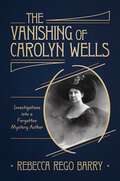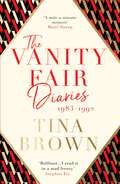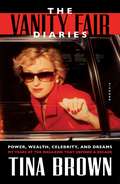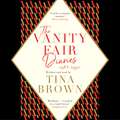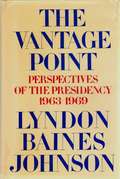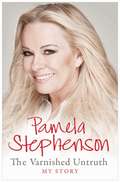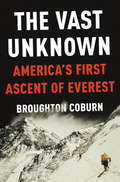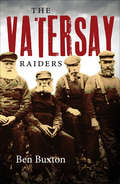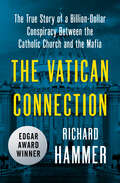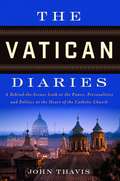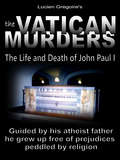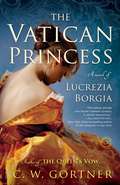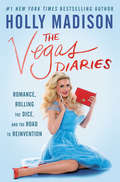- Table View
- List View
The Value of Emily Dickinson
by Mary LoeffelholzThe Value of Emily Dickinson is the first compact introduction to Dickinson to focus primarily on her poems and why they have held and continue to hold such significance for readers. It addresses the question of literary value in light of current controversies dividing scholars, including those surrounding the critical issue of whether her writings are best appreciated as visual works of manuscript art or as rhymed and metered poems intended for the inner ear. Mary Loeffelholz deftly incorporates Dickinson's distinctive biography and her historical, religious, and cultural contexts into close readings, tracing the evolution of Dickinson's style. This volume - which considers not only the complex history of Dickinson's poems in print, but also their future in digital formats - will be an invaluable resource for undergraduate and graduate students seeking to better understand the importance of this seminal American poet.
The Vamps: 100% Official
by The VampsSince forming on YouTube in 2012, The Vamps have become one of the biggest bands in the UK. They have travelled the world with massive arena tours, sold hundreds of thousands of records, and gained legions of amazing and devoted fans. They have gone from schoolboys to superstardom in just a few years, and for the first time Connor, Brad, Tristan and James tell their story. From life on the road to dealing with their new-found fame, nothing is off-limits.Featuring exclusive behind-the-scenes photography, this is a fully-illustrated joint autobiography: the perfect book for any Vamps fan.
The Vamps: 100% Official
by The VampsSince forming on YouTube in 2012, The Vamps have become one of the biggest bands in the UK. They have travelled the world with massive arena tours, sold hundreds of thousands of records, and gained legions of amazing and devoted fans. They have gone from schoolboys to superstardom in just a few years, and for the first time Connor, Brad, Tristan and James tell their story. From life on the road to dealing with their new-found fame, nothing is off-limits.Featuring exclusive behind-the-scenes photography, this is a fully-illustrated joint autobiography: the perfect book for any Vamps fan.
The Vamps: Official Book
by The VampsSince forming on YouTube in 2012, The Vamps have become one of the biggest bands in the UK. They have travelled the world with massive arena tours, sold hundreds of thousands of records, and gained legions of amazing and devoted fans. They have gone from schoolboys to superstardom in just a few years, and for the first time Connor, Brad, Tristan and James tell their story. From life on the road to dealing with their new-found fame, nothing is off-limits.Featuring exclusive behind-the-scenes photography, this is a fully-illustrated joint autobiography: the perfect book for any Vamps fan.
The Van Gogh Sisters
by Willem-Jan VerlindenThis biography of Vincent van Gogh’s sisters tells the fascinating story of the lives of these women whose history has largely been neglected. Many people are familiar with the life and art of Vincent van Gogh, and his extensive correspondence with his brother Theo. But their sisters—Ana, Lies, and Wil van Gogh—have gone overlooked until now. In this compelling group biography based on extensive primary resources, art historian Willem-Jan Verlinden brings Vincent’s three sisters into the spotlight. At a time when the feminist movement was beginning to take root and idealists were clamoring for revolution, the Van Gogh sisters recorded their aspirations and dreams, their disappointments and grief. Based on little-known correspondence between the sisters, this fascinating account of these remarkable women captures a moment of profound social, economic, and artistic change. With great clarity and empathy, The Van Gogh Sisters relates the sisters’ intimate discussions of art, poetry, books, personal ambitions, and employment. Their story will resonate with readers and broaden understandings of Vincent van Gogh’s childhood. Set against the backdrop of a turbulent period in nineteenth-century history this story sheds new light on these impressive women, deepening our understanding of this unique and often troubled family.
The Vandemonian: Wall Street and Silicon Valley Collide
by Allan Charles Branch"A memoir that is as much about human frailty as it is about achievement." In his remarkable memoir, Allan Charles Branch invites readers on an unpredictable global journey from an &‘unremarkable&’ Tasmanian boy to a revolutionary force in multiple industries. He defied the odds to innovate technologies and resurrect failing companies worldwide. Allan's early years in Tasmania were spent navigating government, business, and education as he sought to discover who he wasn&’t. This journey led to a bold leap into entrepreneurship, where he established Tasmania&’s first high-tech company. Relocating to Silicon Valley, he mingled with industry legends like Steve Wozniak and Isaac Asimov, pushing the boundaries of robotics and business. By the time he stepped away, he had possibly designed, built, and sold more intelligent robots than anyone else, redefining his identity as an inventor and entrepreneur. But Allan&’s journey didn&’t end there. He embarked on a new chapter as a transformational leader, traveling the globe to rescue seemingly irredeemable companies using innovative problem-solving techniques honed through years of experience. Along the way, he not only revived businesses but also saved countless jobs and livelihoods. Through these experiences, Allan reflects on the personal toll of his relentless career, navigating the complexities of success, loneliness, and self-discovery. Told through vivid vignettes, The Vandemonian captures Allan&’s extraordinary journey of invention and transformation—revealing the man behind the robots. Blending the introspective depth of Paul Auster&’s Winter Journal with the transformative arc of Frank McCourt&’s Angela&’s Ashes, The Vandemonian is a compelling narrative of human ingenuity and perseverance.
The Vanguard Of American Volunteers In The Fighting Lines And In Humanitarian Service: August,1914-April, 1917 [Illustrated Edition]
by Edwin MorseIllustrated with 6 portraitsEven before the official entry of the United States of America into the First World War in April 1917, many of its citizens had already crossed over "The Pond" and already had lent their efforts to the Allied cause. The author Edwin Morse set himself a terribly difficult task to record even a handful of these gallant soldiers, doctors, surgeons and aviators; he selected as a sampling of 34 different stories which he set out to tell in brief. Those he selected contributed to the Allied cause in different and diverse ways - some joined the Foreign Legion, some the British Army, others supported the medical services or drove ambulances; still further more joined the French Army aviators and formed the famous Lafayette Escadrille.
The Vanished Landscape: A 1930s Childhood in the Potteries
by Paul JohnsonPaul Johnson recalls, with warmth and affection, his childhood in the Potteries - and a unique industrial landscape that has now gone for everPaul Johnson, the celebrated historian, grew up in Tunstall, one of the six towns around Stoke-on-Trent that made up `the Potteries'. From an early age he was fascinated by the strange beauty of its volcanic landscape of fiery furnaces belching out heat and smoke. As a child he often accompanied his father - headmaster of the local art school and desperate to find jobs for his students, for this was the Hungry Thirties - to the individual pottery firms and their coal-fired ovens. His adored mother and father are at the heart of this story and his older sisters who, as much as his parents, brought him up. Children made their own amusements to an extent unimaginable today, and his life was extraordinarily free and unsupervised. No door was locked - `Poverty was everywhere but so were the Ten Commandments.' The book ends in 1938 as the 11-year-old author queues at the town-hall for a gas mask.
The Vanished Landscape: A 1930s Childhood in the Potteries
by Paul JohnsonPaul Johnson recalls, with warmth and affection, his childhood in the Potteries - and a unique industrial landscape that has now gone for everPaul Johnson, the celebrated historian, grew up in Tunstall, one of the six towns around Stoke-on-Trent that made up `the Potteries'. From an early age he was fascinated by the strange beauty of its volcanic landscape of fiery furnaces belching out heat and smoke. As a child he often accompanied his father - headmaster of the local art school and desperate to find jobs for his students, for this was the Hungry Thirties - to the individual pottery firms and their coal-fired ovens. His adored mother and father are at the heart of this story and his older sisters who, as much as his parents, brought him up. Children made their own amusements to an extent unimaginable today, and his life was extraordinarily free and unsupervised. No door was locked - `Poverty was everywhere but so were the Ten Commandments.' The book ends in 1938 as the 11-year-old author queues at the town-hall for a gas mask.
The Vanishing Generation: Faith and Uprising in Modern Uzbekistan
by Bagila BukharbayevaAs a young reporter in Uzbekistan, Bagila Bukharbayeva was a witness to her countrys search for an identity after the collapse of the Soviet Union. While self-proclaimed religious leaders argued about what was the true Islam, Bukharbayeva shows how some of the neighborhood boys became religious, then devout, and then a threat to the country's authoritarian government. The Vanishing Generation provides an unparalleled look into what life is like in a religious sect, the experience of people who live for months and even years in hiding, and the fabricated evidence, torture, and kidnappings that characterize an authoritarian government. In doing so, she provides a rare and unforgettable story of what life is like today inside the secretive and tightly controlled country of Uzbekistan. Balancing intimate memories of playmates and neighborhood crushes with harrowing stories of extremism and authoritarianism, Bukharbayeva gives a voice to victims whose stories would never otherwise be heard.
The Vanishing Velázquez: A 19th Century Bookseller's Obsession with a Lost Masterpiece
by Laura CummingFrom one of the world's most expert art critics, the incredible true story--part art history and part mystery--of a Velazquez portrait that went missing and the obsessed nineteenth-century bookseller determined to prove he had found it.When John Snare, a nineteenth-century provincial bookseller, traveled to a liquidation auction, he stumbled on a vivid portrait of King Charles I that defied any explanation. The Charles of the painting was young--too young to be king--and yet also too young to be painted by the Flemish painter to which the work was attributed. Snare had found something incredible--but what? His research brought him to Diego Velazquez, whose long-lost portrait of Prince Charles has eluded art experts for generations. Velazquez (1599-1660) was the official painter of the Madrid court, during the time the Spanish Empire teetered on the edge of collapse. When Prince Charles of England--a man wealthy enough to help turn Spain's fortunes--ventured to the court to propose a marriage with a Spanish princess, he allowed just a few hours to sit for his portrait. Snare believed only Velazquez could have met this challenge. But in making his theory public, Snare was ostracized, victim to aristocrats and critics who accused him of fraud, and forced to choose, like Velazquez himself, between art and family. A thrilling investigation into the complex meaning of authenticity and the unshakable determination that drives both artists and collectors of their work, The Vanishing Velazquez travels from extravagant Spanish courts in the 1700s to the gritty courtrooms and auction houses of nineteenth-century London and New York. But it is above all a tale of mystery and detection, of tragic mishaps and mistaken identities, of class, politics, snobbery, crime, and almost farcical accident. It is a magnificently crafted page-turner, a testimony to how and why great works of art can affect us to the point of obsession.
The Vanishing of Carolyn Wells
by Rebecca Rego BarryThe Vanishing of Carolyn Wells is the first biography of one of the &“lost ladies&” of detective fiction who wrote more than eighty mysteries and hundreds of other works between the 1890s and the 1940s.Carolyn Wells (1862–1942) excelled at writing country house and locked-room mysteries for a decade before Agatha Christie entered the scene. In the 1920s, when she was churning out three or more books annually, she was dubbed &“about the biggest thing in mystery novels in the US.&”On top of that, Wells wielded her pen in just about every literary genre, producing several immensely popular children&’s books and young adult novels; beloved anthologies; and countless stories, prose, and poetry for magazines such as Thrilling Detective, Life, The Saturday Evening Post, Harper&’s, and The New Yorker. All told, Wells wrote over 180 books. Some were adapted into silent films, and some became bestsellers. Yet a hundred years later, she has been all but erased from literary history. Why? How?This investigation takes us on a journey to Rahway, New Jersey, where Wells was born and is buried; to New York City&’s Upper West Side, where she spent her final twenty-five years; to the Library of Congress, where Carolyn&’s world-class collection of rare books now resides; and to many other public and private collections where exciting discoveries unfolded.Part biography and part sleuthing narrative, The Vanishing of Carolyn Wells recovers the life and work of a brilliant writer who was considered one of the funniest, most talented women of her time.
The Vanity Fair Diaries: 1983 - 1992
by Tina Brown'Indiscreet, brilliantly observed, frequently hilarious' Evening Standard'Hang on - it's a wild ride' Meryl StreepIt's 1983. A young Englishwoman arrives in Manhattan on a mission. Summoned in the hope that she can save Condé Nast's troubled new flagship Vanity Fair, Tina Brown is plunged into the maelstrom of competitive New York media. She survives the politics and the intrigue by a simple stratagem: succeeding. Here are the inside stories of the scoops and covers that sold millions: the Reagan kiss, the meltdown of Princess Diana's marriage to Prince Charles, the sensational Annie Leibovitz cover of a gloriously pregnant, naked Demi Moore. Written with dash and verve, the diary is also a sharply observed account of New York and London society. In its cinematic pages the drama, comedy and struggle of raising a family and running an 'it' magazine come to life.
The Vanity Fair Diaries: 1983 - 1992
by Tina BrownNamed one of the best books of 2017 by Time, People, The Guardian, Paste Magazine, The Economist, Entertainment Weekly, & VogueTina Brown kept delicious daily diaries throughout her eight spectacular years as editor-in-chief of Vanity Fair. Today they provide an incendiary portrait of the flash and dash and power brokering of the Excessive Eighties in New York and Hollywood.The Vanity Fair Diaries is the story of an Englishwoman barely out of her twenties who arrives in New York City with a dream. Summoned from London in hopes that she can save Condé Nast's troubled new flagship Vanity Fair, Tina Brown is immediately plunged into the maelstrom of the competitive New York media world and the backstabbing rivalries at the court of the planet's slickest, most glamour-focused magazine company. She survives the politics, the intrigue, and the attempts to derail her by a simple stratagem: succeeding. In the face of rampant skepticism, she triumphantly reinvents a failing magazine.Here are the inside stories of Vanity Fair scoops and covers that sold millions—the Reagan kiss, the meltdown of Princess Diana's marriage to Prince Charles, the sensational Annie Leibovitz cover of a gloriously pregnant, naked Demi Moore. In the diary's cinematic pages, the drama, the comedy, and the struggle of running an "it" magazine come to life. Brown's Vanity Fair Diaries is also a woman's journey, of making a home in a new country and of the deep bonds with her husband, their prematurely born son, and their daughter.Astute, open-hearted, often riotously funny, Tina Brown's The Vanity Fair Diaries is a compulsively fascinating and intimate chronicle of a woman's life in a glittering era.
The Vanity Fair Diaries: 1983–1992
by Tina BrownTina Brown kept delicious daily diaries throughout her eight spectacular years as editor-in-chief of Vanity Fair. Today they provide an incendiary portrait of the flash and dash and power brokering of the Excessive Eighties in New York and Hollywood.'A fabulous odyssey ... I read it in a mad frenzy' Stephen Fry'Full of creative glee, passion and wild-ride excitement' Simon Schama'Hang on - it's a wild ride' Meryl StreepThe Vanity Fair Diaries is the story of an Englishwoman barely out of her twenties who arrives in New York City with a dream. Summoned from London in hopes that she can save Condé Nast's troubled new flagship Vanity Fair, Tina Brown is immediately plunged into the maelstrom of the competitive New York media world and the backstabbing rivalries at the court of the planet's slickest, most glamour-focused magazine company. She survives the politics, the intrigue and the attempts to derail her by a simple stratagem: succeeding. In the face of rampant skepticism, she triumphantly reinvents a failing magazine.Here are the inside stories of Vanity Fair scoops and covers that sold millions: the Reagan kiss, the meltdown of Princess Diana's marriage to Prince Charles, the sensational Annie Leibovitz cover of a gloriously pregnant, naked Demi Moore. In the diary's cinematic pages, the drama, comedy and struggle of running an 'it' magazine come to life. Brown's Vanity Fair Diaries is also a woman's journey, of making a home in a new country and of the deep bonds with her husband, their prematurely born son and their daughter.Astute, open-hearted, often riotously funny, Tina Brown's The Vanity Fair Diaries is a compulsively fascinating and intimate chronicle of a woman's life in a glittering era.(p) Macmillan US 2017 Written and Read by Tina Brown
The Vantage Point: Perspectives of the Presidency, 1963-1969
by Lyndon B. JohnsonThe book focuses on a wide variety of accomplishments and events, both domestic and foreign, which shaped the Presidency of Lyndon Johnson. In addition to the war in Vietnam, Johnson tells of the War on Poverty here in the United States.
The Varnished Untruth
by Pamela StephensonAlong with my own personal story, I am going to write down a few things that may amuse you (or even take you down some other emotional path) and I'll let you in on a few so-far-unrevealed aspects of my life. I'll try to leave out the boring bits. Don't be thinking this is easy for me. I'm darn good at getting under other people's skin, but opening up about my own life is quite a different matter. So how shall I portray myself? There are choices, you know: Wife, mother, psychologist, writer, comedian, actor, dancer, diver, gypsy, dreamer, rich girl, poor girl, beggar girl, thief. I am all of those and more. Tell you what, you decide. You decide exactly what I am...A complicated childhood in Australia, a bold move to London, being a woman in a man's world on Not the Nine O'Clock News, becoming Mrs Billy Connolly, motherhood, career changes and then Strictly Come Dancing - told in her own inimitable style, The Varnished Untruth is Pamela Stephenson's own story.
The Varnished Untruth
by Pamela StephensonAlong with my own personal story, I am going to write down a few things that may amuse you (or even take you down some other emotional path) and I'll let you in on a few so-far-unrevealed aspects of my life.I'll try to leave out the boring bits.Don't be thinking this is easy for me.I'm darn good at getting under other people's skin, but opening up about my own life is quite a different matter. So how shall I portray myself? There are choices, you know:Wife, mother, psychologist, writer, comedian, actor, dancer, diver, gypsy, dreamer, rich girl, poor girl, beggar girl, thief. I am all of those and more.Tell you what, you decide. You decide exactly what I am...A complicated childhood in Australia, a bold move to London, being a woman in a man's world on Not the Nine O'Clock News, becoming Mrs Billy Connolly, motherhood, career changes and then Strictly Come Dancing - told in her own inimitable style, The Varnished Untruth is Pamela Stephenson's own story.
The Vast Unknown
by Broughton CoburnBy the author of the New York Times bestselling Everest: Mountain Without Mercy, this chronicle of the iconic first American expedition to Mt. Everest in May 1963 - published to coincide with the climb's 50th anniversary - combines riveting adventure, a perceptive analysis of its dark and terrifying historical context, and revelations about a secret mission that followed. In the midst of the Cold War, against the backdrop of the Bay of Pigs fiasco, the space race with the Soviet Union, and the quagmire of the Vietnam War, a band of iconoclastic, independent-minded American mountaineers set off for Mt. Everest, aiming to restore America's confidence and optimism. Their objective is to reach the summit while conducting scientific research, but which route will they take? Might the Chinese, in a public relations coup, have reached the top ahead of them? And what about another American team, led by the grandson of a President, that nearly bagged the peak in a bootleg attempt a year earlier? The Vast Unknown is, on one level, a harrowing, character-driven account of the climb itself and its legendary team of alternately inspiring, troubled, and tragic climbers who suffered injuries, a near mutiny, and death on the mountain. It is also an examination of the profound sway the expedition had over the American consciousness and sense of identity during a time when the country was floundering. And it is an investigation of the expedition's little-known outcome: the selection of a team to plant a CIA surveillance device on the Himalayan peak of Nanda Devi, to spy into China where Defense Intelligence learned that nuclear missile testing was underway.From the Hardcover edition.
The Vatersay Raiders
by Ben BuxtonA Scottish historian recounts how Hebridean croft farmers raided a neighboring island in order to survive—and sparked a national debate over land rights. In 1906, men from the Hebridean islands of Barra and Mingulay took possession of the uninhabited island of Vatersay. Two years later, they were imprisoned for refusing to leave—and for building huts and planting potatoes without permission. The case caused an outcry across Scotland, and the government eventually bought Vatersay for the purpose of croft farming. In the first book on the subject, historian Ben Buxton tell the full story of the Vatersay Raiders: their struggle to escape the oppressive policies of an absentee landowner, the raiding and settlement of the island, and the fraught process of dividing it up into crofts. The book also documents the larger history of Vatersay, from intriguing monuments of prehistory to shipwrecks and the 19th century evictions that left it uninhabited. An outline of subsequent developments, including the Vatersay Causeway which connects the island to Barra, completes the narrative.
The Vatican Connection: The True Story of a Billion-Dollar Conspiracy Between the Catholic Church and the Mafia
by Richard HammerWinner of the Edgar Award: The riveting account of an audacious fraud scheme that stretched from a Mafia hangout on the Lower East Side to the Vatican. With a round, open face and a penchant for tall tales, Matteo de Lorenzo resembled everyone&’s kindly uncle. But Uncle Marty, as he was known throughout the Genovese crime family, was one of the New York mob&’s top earners throughout the 1960s and &’70s, the mastermind of a billion-dollar trade in stolen and counterfeit securities. In the spring of 1972, de Lorenzo and his shrewd and ruthless business partner, Vincent Rizzo, traveled to Europe to discuss a plan to launder millions of dollars worth of phony securities. Shockingly, the plot involved Archbishop Paul Marcinkus, the scandal-plagued president of the Vatican Bank. Unbeknownst to de Lorenzo and Rizzo, however, the NYPD was already on the case—thanks to the crusading work of Det. Joseph Coffey. Coffey, the legendary New York policeman who investigated the Lufthansa heist and took the Son of Sam&’s confession, first learned of the scheme in a wiretap related to the attempted mob takeover of the Playboy Club in Manhattan. From those unlikely beginnings, Detective Coffey worked tirelessly to trace the fraudulent stocks and bonds around the world and deep into the corridors of power in Washington, DC, and Rome. Meticulously researched and relentlessly gripping, The Vatican Connection is a true story of corruption and deceit, packed with &“all the ingredients of a thriller&” (San Francisco Chronicle).
The Vatican Diaries: A Behind-the-Scenes Look at the Power, Personalities, and Politics at the Heart of the Catholic Church
by John ThavisThe revealing "New York Times" bestseller examines the reign of Pope Benedict, the papal conclave process, and the history of one of the worlds oldest and most mysterious institutions For more than twenty-five years John Thavis held one of the most fascinating journalistic jobs in the world: reporting on the inner workings of the Vatican. His daily exposure to the power, politics, and personalities in the seat of Roman Catholicism gave him a unique, behind-the-scenes perspective on an institution that is far less monolithic and unified than it first appears. Thavis takes readers from a bell tower high above St. Peters to the depths of the basilica and the saints burial place, from the politicking surrounding the election of a new pope and the ever-growing sexual abuse scandals around the world to controversies about the Vaticans stand on contraception, and more. Perceptive, sharply written, and witty, "The Vatican Diaries" will appeal not only to Catholics (lapsed as well as devout) but to any readers interested in international diplomacy and the role of religion in an increasingly secularized world.
The Vatican Murders: The Life and Death of John Paul I
by Lucien Gregoire"A monumental work of twentieth century capitalism as it was jointly embraced by the Vatican and the United States and those caught up in it. Top-shelf CIA-Vatican intrigue." The Times // Some claim the Vatican Bank had to do with his murder. Others claim his threat to change doctrine that unfairly penalizes the lives of innocent people drove curial cardinals in the clandestine deed. Others claim the threat he was to the capitalistic tenets upon which the United States was founded rallied the CIA to action. Others whisper his sexual orientation led to his demise. 'The Vatican Murders' reveals how each of these played a role in the murder of the youngest pope to die in four hundred years. // When elected he was tabbed a liberal on a few bits which had reached outside Italy. Like the times he had been caught baptizing illegitimate children, to the times he had been caught officiating at funerals of the remarried, to the times he ordered hospitals to admit partners of homosexuals into ICUs, to the time he defended their right to parent children, to the times he defied the contraception ban, to the time he declared "God is the Father. More so, the Mother." // On March 13, 1978, fourteen men sat around a table in a village café in northern Italy. In casual clothes they went unnoticed though one was the Pope and another the Marxist leader of the Russian Orthodox Church. Included were Italian cardinals and statesmen who had been behind the rise of the Communist Party in Italy. The others were cardinals of impoverished parts of the world. Together they comprised the leadership of the Marxist movement in the western world. They left at 4 o'clock and Aldo Moro reserved the table "...for this time next year." // On March 13, 1979, cardinals Benelli and Felici decided not to travel to northern Italy that day. After all, all the others were dead. They--unaware of their impending doom--were, too, as good as dead........ True Life - True Crime.
The Vatican Princess
by C. W. GortnerFor fans of Philippa Gregory and Alison Weir, bestselling author C. W. Gortner effortlessly weaves history and drama in this captivating novel about one of the world's most notorious families. Glamorous and predatory, the Borgias fascinated and terrorized fifteenth-century Renaissance Italy, and Lucrezia Borgia, beloved daughter of the pope, was at the center of the dynasty's ambitions. Slandered as a heartless seductress who lured men to their doom, was she in fact the villainess of legend, or was she trapped in a familial web, forced to choose between loyalty and survival? With the ascension of the Spaniard Rodrigo Borgia as Pope Alexander VI, a new era has dawned in Rome. Benefitting from their father's elevation are the new pope's illegitimate children--his rival sons, Cesare and Juan, and beautiful young daughter Lucrezia--each of whom assumes an exalted position in the papal court. Privileged and adored, Lucrezia yearns to escape her childhood and play a part in her family's fortunes. But Rome is seductive and dangerous: Alliances shift at a moment's notice as Italy's ruling dynasties strive to keep rivals at bay. As Lucrezia's father faces challenges from all sides, the threat of a French invasion forces him to marry her off to a powerful adversary. But when she discovers the brutal truth behind her alliance, Lucrezia is plunged into a perilous gambit that will require all her wits, cunning, and guile. Escaping her marriage offers the chance of happiness with a passionate prince of Naples, yet as scandalous accusations of murder and incest build against her, menacing those she loves, Lucrezia must risk everything to overcome the lethal fate imposed upon her by her Borgia blood. Beautifully wrought, rich with fascinating historical detail, The Vatican Princess is the first novel to describe Lucrezia's coming-of-age in her own voice. What results is a dramatic, vivid tale set in an era of savagery and unparalleled splendor, where enemies and allies can be one and the same, and where loyalty to family can ultimately be a curse.Advance praise for The Vatican Princess"A tale of passion, political intrigue, and poisonous power. Assiduously researched and expertly crafted, this novel takes readers inside the treacherous world of the Borgias--one of history's most dysfunctional ruling families--and brings to life the sympathetic and freshly imagined character of their leading lady, Lucrezia. This unholy plunge into Rome's darkest dynasty is wholly engrossing."--Allison Pataki, New York Times bestselling author of Sisi: Empress on Her Own"Elegantly written and deeply researched, with a pacy style and a fine eye for contemporary detail . . . The world of Renaissance Italy is vividly brought to life--I'm captivated by this knowledgeable author's take on the controversial Borgias."--Alison Weir, New York Times bestselling author of Katherine of Aragon, The True Queen "A spiderweb of Renaissance intrigue with a cast of legendary characters, The Vatican Princess tells Lucrezia Borgia's story in her own words. Impressive research, a lush background, and deft characterization of these turbulent times make for a fascinating read."--Margaret George, New York Times bestselling author of Elizabeth I"Here is a marvelously evocative portrait of a young woman caught in a bewildering web of jealousy, family rivalry, vengeance, and papal politics. This is historical fiction at its best, written by a master of the genre."--Patricia Bracewell, author of Shadow on the CrownFrom the Hardcover edition.
The Vegas Diaries: Romance, Rolling the Dice, and the Road to Reinvention
by Holly MadisonThe #1 New York Times bestselling author returns with this candid, humorous, and captivating memoir chronicling her journey toward reinvention and self-acceptance.When you've come out the other side of the bizarre, twisted world of the Playboy mansion, where do you land? If you're Holly Madison . . . there's no place like Las Vegas!After making the sudden decision to reclaim her life, Holly broke free from the sheltered, deceptive confines of the mansion (which meant exiting a hit television show) and was determined to start her life over . . . from scratch. Without the security of a job or relationship, she set out to reinvent herself on no one's terms but her own.Deciding to roll the dice and begin again in the glamorous and dreamlike city of Las Vegas, Holly quickly realized that while she may have left her past in the rearview mirror, the labels and stereotypes that came from it weren't so quick to leave her. With a fierce commitment to take charge of her own narrative, Holly dives headfirst into a journey of self-discovery. After a whirlwind stint on Dancing with the Stars, she snags the coveted lead role in the Strip's hottest new burlesque spectacular and lands a reality series spotlighting her new life as a single woman. If her own television show and dream job as a showgirl weren't enough to keep her busy, Holly explores the decadent, exclusive inner-world of Sin City, navigating it's social and dating scene with humor and heart. When it comes to romance, she is met with an eclectic cast of characters, from fame hounds to long distance loves to the occasional celebrity and more than one tabloid mishap. In this reflective, heartwarming memoir, Holly learns that each dating disaster holds an important, and in some cases difficult to face, lesson about herself.The Vegas Diaries is a comedy of errors, set against the glitz and glamour of the dazzling Vegas strip. Through the wild and crazy experiences on one young woman's quest to "have it all," Holly faces her fears, anxieties, and insecurities to discover that her journey to self-sufficiency is also her path to healing. Letting go of trying to prove herself to others, Holly finally gains the courage to confront her past-and in the process finds the life and love she deserves.



